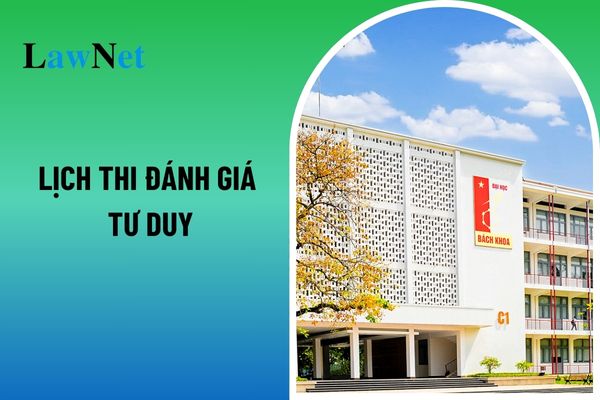What is the official schedule of the Thinking Skills Assessment Exam 2025 held by Hanoi University of Science and Technology? What are the types of higher education institutions?
What is the official schedule of the Thinking Skills Assessment Exam 2025 held by Hanoi University of Science and Technology?
Plan for organizing the Thinking Skills Assessment Exam 2025 by Hanoi University of Science and Technology
Hanoi University of Science and Technology (HUST) has announced the plan for organizing the Thinking Skills Assessment Exam 2025 with the following detailed information:
1. Exam Schedule and Registration
The Thinking Skills Assessment Exam 2025 will be conducted in three phases:
Phase 1:
Exam Dates: January 18, 2025, and January 19, 2025
Registration Opens: From December 1-6, 2024
Phase 2:
Exam Dates: March 8, 2025, and March 9, 2025
Registration Opens: From February 1-6, 2025
Phase 3:
Exam Dates: April 26, 2025, and April 27, 2025
Registration Opens: From April 1-6, 2025
2. Exam Format
The exam will be conducted online using computers at designated exam centers.
3. Exam places
Exam places will be arranged in various localities nationwide, including:
- Hanoi: Hanoi University of Science and Technology, National Economics University, Hanoi University of Civil Engineering, Thuyloi University, University of Transport and Communications, Hanoi University of Industry, University of Economics and Technical Industries, and several other higher education institutions.
- Nghe An: Vinh University
- Thanh Hoa: Hong Duc University
- Hai Phong: Vietnam Maritime University
- Hai Duong: Sao Do University
- Thai Binh: Thai Binh University
- Quang Ninh: Ha Long University
- Ninh Binh: Hoa Lu University
- Ha Tinh: Ha Tinh University
- Nam Dinh: Nam Dinh University of Technology Education
- Hung Yen: Hung Yen University of Technology and Education
- Thai Nguyen: Testing and Quality Assurance Education Center – Thai Nguyen University
- Da Nang: University of Science and Technology – Parent University of Da Nang
- Lao Cai: Thai Nguyen University - Lao Cai Campus
More details can be found in the Plan for Organizing the Thinking Skills Assessment Exam 2025 by Hanoi University of Science and Technology..... download

What is the official schedule of the Thinking Skills Assessment Exam 2025 held by Hanoi University of Science and Technology? What are the types of higher education institutions in Vietnam? (Image from Internet)
What are the State policies on development of higher education in Vietnam?
Under Article 12 of the Law on Higher Education 2012 as amended by Clause 7 Article 1 of the Law on Amendments to Law on Higher Education 2018, State policies on development of higher education in Vietnam are specifically regulated as follows:
1. Development of higher education is meant to develop high quality human resources, meet socio-economic development requirements and ensure national defense and security.
2. Funds and resources shall be given to development of higher education on principles of competitiveness, equality and efficiency through investment in research and development (R&D) investment, signing research and training contracts, offering scholarships, student credit and other forms.
Higher education development will be given certain privileges and incentives in terms of land, tax, credit and other policies.
3. Prioritize investment in development of certain regional and international higher education institutions, academic disciplines and teacher training institutions; develop some special academic disciplines and higher education institutions capable of achieving strategic national and regional objectives.
Encourage rearrangement and merger of universities into parent universities; apply technology to higher education.
4. Seek private investment in higher education; encourage development of private higher education institution; give priority to non-profit private higher education institution; provide incentives for organizations and individuals that invest in education and training, science and technology activities in higher education institutions; grant tax exemption or reduction to property that are donated to serve higher education, given as scholarships or participation in student credit programs.
5. Introduce uniform policies to ensure autonomy and accountability of higher education institutions.
6. Ensure relation between training and demand for labor; research into application of science and technology; enhance cooperate between higher education institutions, enterprises and science and technology organizations; provide tax incentives for science and technology products of higher education institutions; encourage organizations and enterprises to facilitate students and lecturers to improve practical skills, participate in internship, scientific research and technology transfers in order to improve training quality.
7. Attract, employ lecturers and provide benefits for lecturers in order to improve their quality; focus on increasing the quantity of lecturers that are masters, doctors and leading professors in higher education institutions.
8. Give priority to people eligible for social benefits (hereinafter referred to as “disadvantaged people"), people in extremely disadvantaged areas and students in special academic disciplines in order to ensure adequate human resources for socio-economic development; ensure gender equality in higher education.
9. Encourage and intensify international integration and cooperation in order to raise Vietnam’s higher education to regional and international levels.
What are the types of higher education institutions in Vietnam?
Pursuant to Clause 2 Article 7 of the Law on Higher Education 2012 as amended by Clause 4 Article 1 of the Law on Amendments to Law on Higher Education 2018, types of higher education institutions in Vietnam include:
- Public higher education institutions invested, maintained and represented by the State as the owner;
- Private higher education institutions invested and maintained domestic or foreign investors.
Note:
A non-profit higher education institution is one in which the investor declare that the institution does not run for profit as written in the decision to permit its establishment or conversion; the investor will not withdraw capital or receive dividends; the annual accumulated profit shall be considered non-distributable property and will be used as reinvestment in such institution.
Only conversion from a private higher education institution to a non-profit private higher education institution is permitted.

